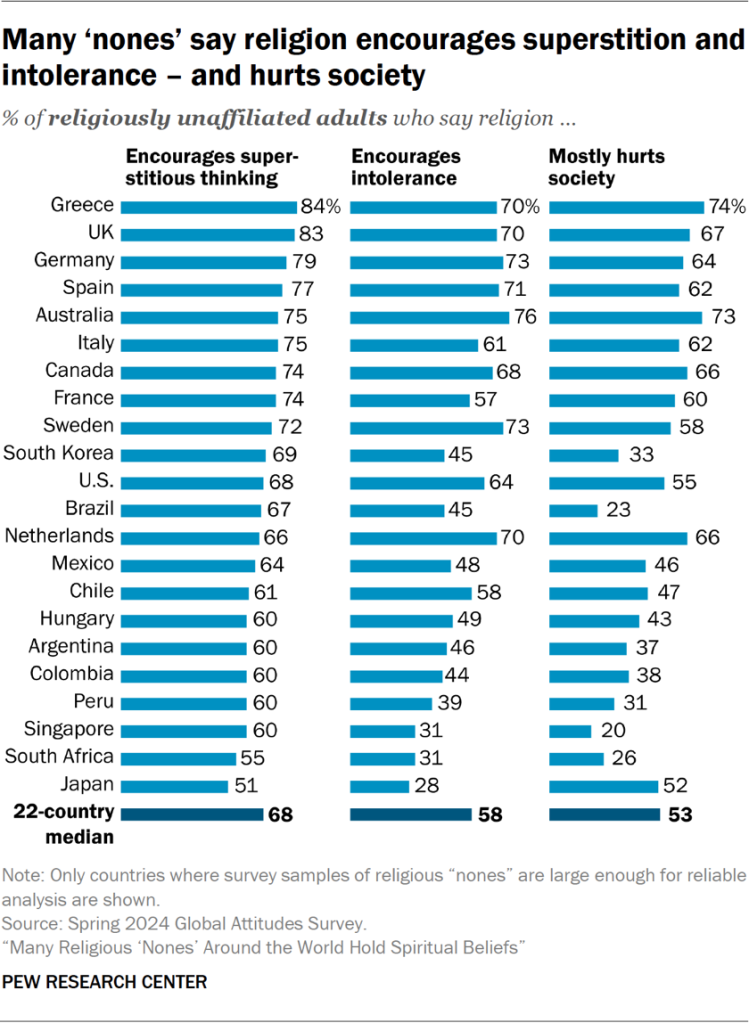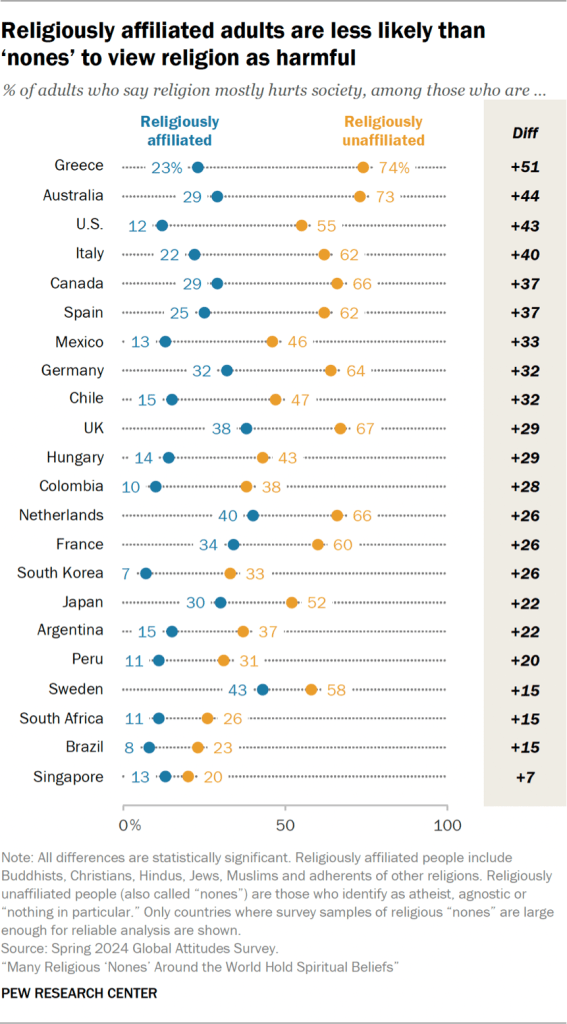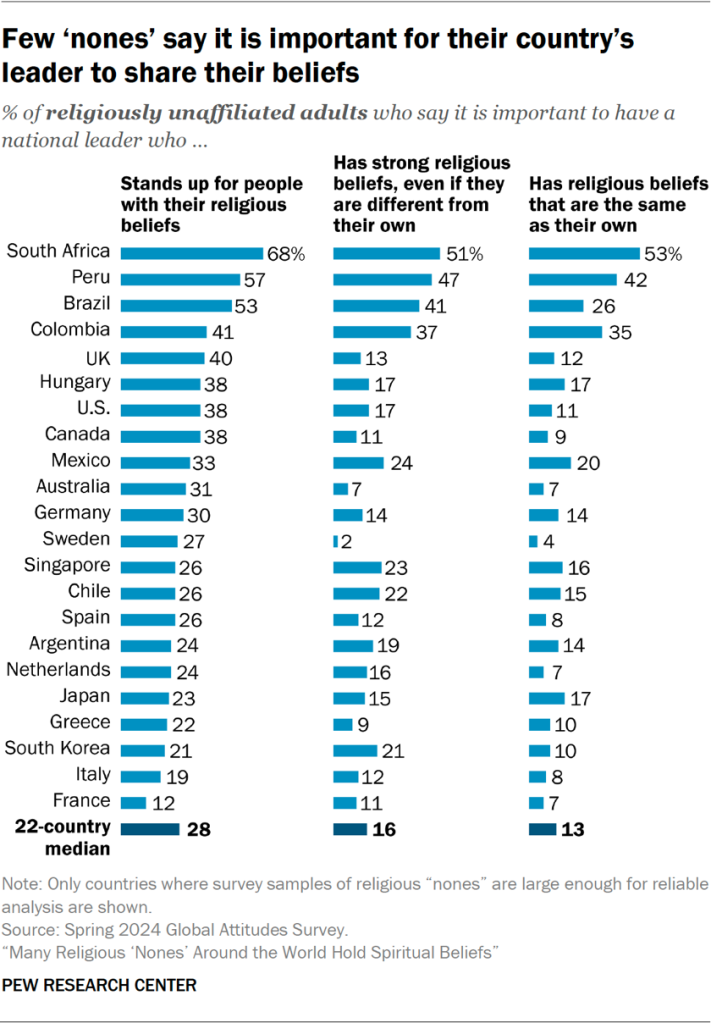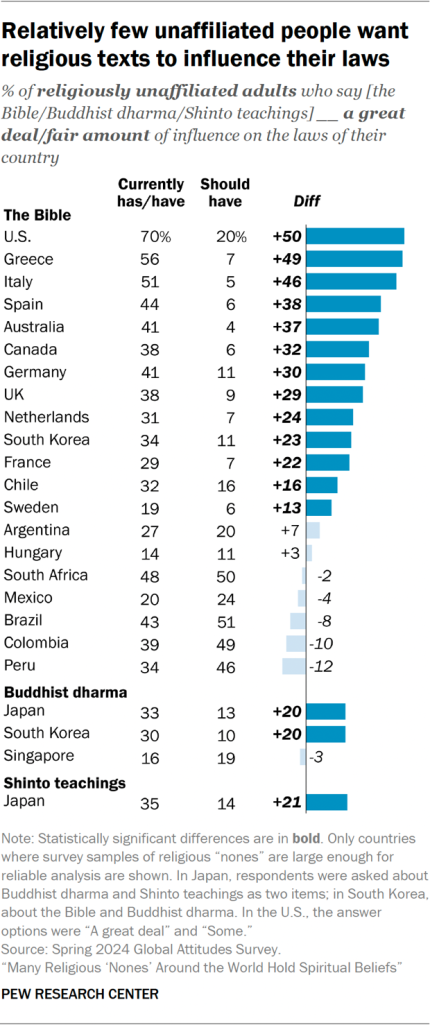What are religious ‘nones’?
“Nones” are adults who describe themselves religiously as atheist, agnostic or “nothing in particular.” This report uses the terms “nones” and “religiously unaffiliated” interchangeably.
Negative views about religion’s influence on society are fairly common among “nones” across the 22 countries analyzed in this study.15
We asked respondents three separate questions about the social impacts of religion: whether religion encourages superstitious thinking; whether religion encourages tolerance or intolerance; and whether religion mostly helps or mostly hurts society.16
In all 22 countries, at least half of religiously unaffiliated adults say that religion encourages superstitious thinking. This rises to 83% of “nones” in the United Kingdom and 84% in Greece.

In about half of the countries, a majority of “nones” also say religion encourages intolerance. This includes 76% of “nones” in Australia and 73% each in Germany and Sweden.
“Nones” in Europe tend to be especially likely to voice negative views of religion. For example, most religiously unaffiliated adults in Spain say that religion encourages superstitious thinking (77%) and intolerance (71%), and that it mostly hurts society (62%).
However, in a handful of countries in other regions, religiously unaffiliated people are more positive about religion. In Brazil, Singapore and South Africa, for instance, only about a quarter or fewer of “nones” say religion mostly hurts society. Majorities of “nones” in these countries say religion mostly helps society.

As a general pattern around the world, though, “nones” are much more likely than adults with a religious affiliation to express negative views about religion. In Greece, for example, 74% of “nones” say religion mostly hurts society, compared with 23% of people identifying with a religion (mostly Christianity) who say this.
“Nones” also are more likely than the religiously affiliated to say religion encourages superstition and intolerance. They are less likely than the affiliated to view religious traits as important for national leaders, and less inclined to say that religious texts should influence national laws.
Jump to sections on: Views of ‘nones’ on the religion of their country’s leader |What ‘nones’ say about religion’s influence on their country’s laws| Differences in the views of ‘nones’
Views of ‘nones’ on the religion of their country’s leader
Relatively few “nones” (a median of 13% across the 22 countries covered in this report) say it is important for the leader of their country to have religious beliefs that are the same as their own.17

Similarly low shares (16% median) say it’s important for their national leader to have strong religious beliefs, even if those beliefs differ from their own.
Overall, slightly higher shares of “nones” say it is important to have a leader who stands up for people with their religious beliefs (28% median).
For example, in the Netherlands, 7% of “nones” say it’s important for the prime minister to share their beliefs, while 16% say it is important for the prime minister to have strong religious beliefs, and 24% say it is important for the prime minister to stand up for people with their religious beliefs (i.e., the religiously unaffiliated respondent’s beliefs).
South Africa stands out as the only country where half or more of “nones” say all three measures are important, including 68% who say it is important for the president to stand up for people with their religious beliefs.
What ‘nones’ say about religion’s influence on their country’s laws
The survey also asked how much influence religious texts or teachings currently have on the laws of each country, and whether respondents think these sacred texts or teachings should have that much influence.
The specific text mentioned in the question depended on the historically predominant religion in each country.18
In many of the 22 countries covered here, “nones” are significantly more likely to say that religious texts do play a role in their country’s laws than to say that those texts should play a role.

In South Korea, for example, “nones” are three times as likely to say the Bible currently has a great deal or fair amount of influence on the laws of their country as they are to say the Bible should have that level of influence on their laws (34% vs. 11%). A similar pattern occurs when South Korean “nones” are asked about the influence of Buddhist dharma on their country’s laws (30% vs. 10%).
In almost all countries analyzed, a quarter or fewer of “nones” say that religious texts or teachings should have a great deal or a fair amount of influence on laws. However, Brazil, Colombia, Peru and South Africa stand out as exceptions; in these countries, close to half of “nones” say the Bible should have at least a fair amount of influence on their country’s laws.
Greece and the United States are the only places where a majority of “nones” say the Bible currently has at least a fair amount of influence on the laws in their country. The unaffiliated in Hungary, Mexico, Singapore and Sweden are the least likely to say that a religious text has influence over their laws; in those four countries, only about a fifth or fewer of “nones” take that position.
Differences in the views of ‘nones’
Overall, “nones” who say religion is not at all important to them are much more likely than “nones” who ascribe at least a little importance to religion to view religion’s role in society negatively.
For example, in Canada, 74% of “nones” who say religion is not at all important in their lives also express the view that religion mostly hurts society. Among other Canadian “nones,” 48% say religion mostly hurts society.

And in most surveyed countries where we have enough “nones” in both groups to make the comparison, “nones” who view religion as not at all important in their lives are significantly less likely than “nones” who say religion is at least a little important to think that religious texts should influence their country’s laws.
In Chile, for instance, just 8% of “nones” who say religion is not at all important to them want the Bible to have at least some influence on their laws. Among other “nones” in Chile, about three times as many hold this view.
Similar divides emerge between “nones” who say religion is not at all important and other “nones” on the questions about the importance of their national leader’s religious beliefs.
There are no clear or consistent differences between younger and older “nones” – nor between religiously unaffiliated women and men – on views toward religion’s role in society.
Meanwhile, in the U.S., “nones” with at least an associate degree express less favorable views toward religion than do “nones” with less education. But this difference among “nones” by education is not widely present across the other countries surveyed.




